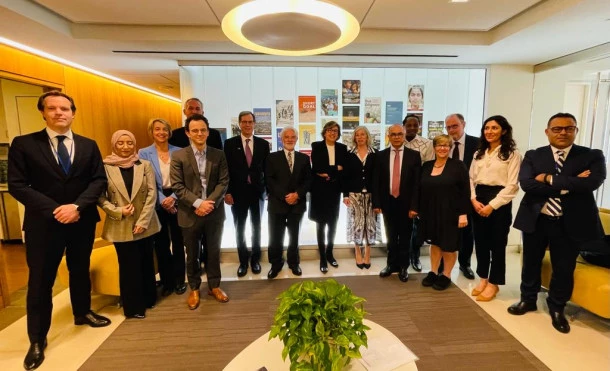A new initiative to strengthen the multilateral education financing system was launched on 13 April at a side-event convened by UNESCO Assistant Director-General for Education Ms. Stefania Giannini and Sierra Leone’s Minister of Education Mr. David Sengeh during the World Bank-IMF Spring Meetings in Washington D.C.
Under the auspices of the High-Level Steering Committee, a series of senior-level meetings will develop actionable proposals for the initiative over the next six months and seek the endorsement by the HLSC Group leaders. The proposals will then be presented to funders of the multilateral education financing system and the boards of the principal multilateral agencies involved in education financing in November 2023 for adoption.

“While it’s essential to invest in education through domestic financing, we won’t see the full potential for better education outcomes in countries unless we also have a well-functioning global financing architecture – especially through the multilateral system,” said Ms. Giannini who also co-chairs the SDG4 High-Level Steering Committee.
“We have to design a more coherent, impactful and accountable financial mechanism and a time-bound roadmap for transforming education,” said Dr. Dipu Moni, Minister of Education of Bangladesh.
Calls to make education financing coherent, impactful, and accountable
The opportunity and push for a new reform effort on the multilateral financing system in 2023 come from three directions. First, the successful Transforming Education Summit in 2022 produced an urgent and expansive call to action on education financing. It called on the education community to revise the international financial and debt architecture to ensure that sufficient financing can be mobilized in support of long-term, sustainable development objectives.
Second, the Board of Directors of the Global Partnership for Education in January 2023 noted a call from partner countries for a strengthened role in the “Education Aid Architecture” and asked the High-Level Steering Committee to consider this.
Third, the 2021 restructuring of the Global Education Cooperation Mechanism and of its Steering Committee transformed it into a representative body with decision-making authority, providing a legitimate and inclusive platform for addressing systemic challenges. These have enabled strategic discussion among stakeholders in the education community to discuss strategically how to work cooperatively.
“Essential to our success is the commitment of all stakeholders, including development partners, to the successful implementation of the roadmap. The SDG4 High-Level Steering Committee, the apex body for global education cooperation, can help us unlock the transformative promise of education towards a sustainable future for all,” said Mr. Chakib Benmoussa, Minister of Education and Sports of Morocco.
The SDG4 High-Level Steering Committee is the global decision-making body for education with its members representing the global education community, comprised of education ministers, principals of regional, multilateral, youth, civil society, teacher and student organizations, the private sector and foundations. The HLSC has been mandated by the UN Secretary- General to lead the follow up to the Transforming Education Summit.
UNESCO is working to highlight this effort at the Summit for A New Global Financial Pact which will take place in Paris in June 2023.
Source: Unesco




















Add Comment